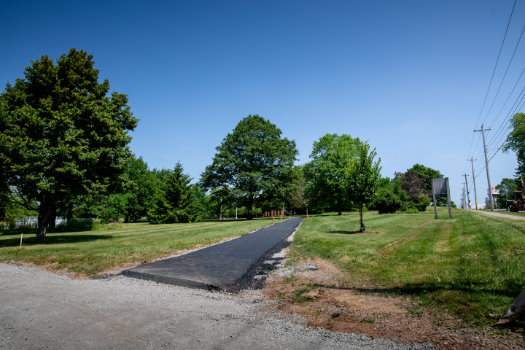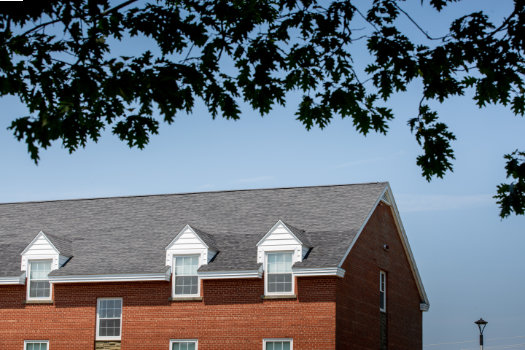News
» Go to news mainA revitalized Campus

 Every time Stephanie MacKenzie (Class of ’04) enters the Agricultural Campus, she is immediately struck by how much has changed since the first time she passed through its doors as a student more than 20 years ago.
Every time Stephanie MacKenzie (Class of ’04) enters the Agricultural Campus, she is immediately struck by how much has changed since the first time she passed through its doors as a student more than 20 years ago.
“It felt like another version of high school,” recalls Stephanie. “Now, it feels more like a university. It’s hard to believe we have something like this in Truro because we are a relatively small town.”
In the decade since it merged with Dalhousie, the campus has undergone some major upgrades, bringing its facilities—some of which date back to the 1960s—boldly into the 21st century. Classrooms have been rethought and reconfigured, roads have been paved, and roofs and windows have been replaced to enhance comfort and energy efficiency. It’s been a remarkable transformation in some regards, and Stephanie has played a vital role in it over the past five years, first as a facilities renewal project manager and now as a planner.
“It is very rewarding work,” she says. “It helps that I have been here for a long time because I know what needs to be addressed but I also know a lot of people on campus, which creates opportunities for conversations about changes we need to make.”
Change has been a constant for the campus since its merger with Dalhousie in 2012—a merger that helped make investments and enhancements possible. “As a campus we were carrying a lot of deferred maintenance, which is typical of universities because it is expensive and the money is not necessarily there to keep up,” says Dr. David Gray, Dean of Agriculture. “Over the past 10 years, Dalhousie has worked through that list. There is not a place on campus you could point to that has not been renovated and upgraded in some way.”

Those upgrades, he notes, have gone beyond maintenance requirements into the realm of bold ideas that have energized the campus as an academic institution and community. He cites the Student Learning Commons as an embodiment of this evolution. “We have a very proud, close-knit student community that has never really had a dedicated space to gather on campus,” he says. “We renovated the top floor of the library to establish the commons. In doing so, we not only created new offices for the student association, which had been in the basement of the Cox Institute, but also offered students a welcoming place with resources such as a self-serve café. It has been a fantastic addition to our campus.”
Another major addition that comes to mind is the biomass generation plant, which is using woodchips from the forestry industry to generate heat for the entire campus. “The plant helped resolve one of the biggest challenges facing the industry: what to do with the waste they generate,” Dr. Gray says. “Now, they have a guaranteed outlet for their waste which is enabling the industry to grow.”
Equally important, it has enabled the campus to make significant progress in its goal to be carbon neutral, a commitment that Dr. Gray says is challenging for agriculture. "We are using an electrostatic filter in the plant that has made it possible for us to reduce emissions to less than our previous oil-fired equipment. The plant's generator simultaneously produces green electricity and enough thermal energy for the campus' needs and we are able to sell electricity back to the Nova Scotia Power grid. That means the whole community benefits from this clean, sustainable energy source."

For Stephanie, there have been several notable upgrades to campus infrastructure in recent years. They include a $2 million effort to improve the grounds, such as paving and sidewalk construction, and more than $3 million invested to upgrade residence rooms with new electrical, lighting, flooring, paint, and furniture along with renewed roofs and windows in some buildings. She is also excited about the refresh of Jenkins Hall that not only enables it to accommodate events such as weddings but also the nutritional needs of the campus’ students.
“We created an area called My Pantry, which is a fully equipped kitchen,” she says. “It enables our students to prepare the kind of meals that they are used to having, so that is a great addition for us. Little touches like that make a real difference. But most of our investments since the merger have focused on enhancing building envelope elements such as windows and doors as they most needed attention.”
With these needs addressed, Stephanie and the campus are turning their attention to other upgrades. Some will occur behind the scenes, such as enhancements of the campus’ mechanical and electrical systems to keep them operating smoothly and achieve energy savings. Others will be more obvious, such as refurbished washrooms. And some will result in improved safety, such as new fire alarm panels that enable easier identification of triggered alarms. But it is plans for smart farm investments—the new Digital Agricultural Centre and the Precision Animal Management Centre—that point the way forward for the campus. They will create a learning and research environment that addresses the challenges facing the industry and sets standards for other institutions to follow. A combination of community support and progress made on campus upgrades will help make that smart farm vision possible.
“All of our maintenance is under control and there are a significant number of campuses across the country that cannot quite claim that,” Dr. Gray says. “Overall, I think we are in a good place and ready to start investing in the agricultural campus of the future.”
Recent News
- From Academia to Agriculture: Former PhD student and supervisor launch innovative vertical farming venture
- Community Representative ‑ Animal Care and Use
- New Face on Campus
- Sowing Seeds of Knowledge: A Gardener’s Journey with DeAnne Pelchat
- Dalhousie Advising Summit
- Legacy Awards 2024
- Fall Food Drive
- Immersive Learning in Digital Agriculture ~ PEI High School Students Experience Virtual Livestock Farming
